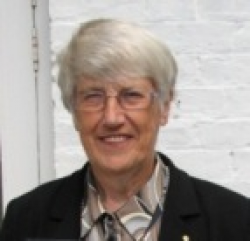Dame Bridget Ogilvie

Dr Dame Bridget Ogilvie Image courtesy of Sense About Science
- Born
- 24 March 1938
Bridget Ogilvie said her first stroke of luck was being born into a family who believed it was as important to educate girls as boys, an unusual attitude at the time. She grew up on a sheep farm in New South Wales and recalls how her father was told by the bank manager to spend his money on fertiliser rather than her education. Fortunately for science, her father disagreed.
Seeing how the application of science, from vaccines to fertilisers, revolutionised agriculture and improved people’s lives, inspired Ogilvie to take up science as a career. She was curious about science from an early age and questioned why parasitic diseases were so hard to treat.
Ogilvie started off studying science at the University of Queensland but transferred to the University of New England in her second year, where she studied rural science. She was the only woman in a class of around 30 students and remembers being told by her tutor that it was good to have a woman in the class as it would increase the attendance rates at lectures.
After graduation, she won a Commonwealth Scholarship and moved to Britain to study for her PhD at Cambridge. This was on Nippostrongylus brasiliensis, a gastrointestinal nematode parasite of rodents. In 1963, she joined the parasitology department, at the National Institute for Medical Research, under Peter Medawar’s directorship. She stayed there until 1986, studying the bodys’ immune responses to disease-causing parasites.
Ogilvie decided to leave research so that she could focus on career development for others and was appointed director of the Wellcome Trust in 1986. She became active in mentoring other women and encouraging them to apply for the jobs that they were qualified to do but sometimes felt uncertain about applying for.
During her time as director, Ogilvie oversaw a significant growth in investment and took the decision to fund the Human Genome Project, which began in 1990. She was also the first chairperson of Medicines for Malaria Venture, which aims to develop affordable anti-malarial drugs.
The public has a right to know what we scientists get up to with their taxes and discuss it with us
Dr Dame Bridget Ogilvie on the Sense About Science website
Ogilvie has also worked to promote public engagement with science, and science education, and has continued to do this since her retirement. She has been chair of COPUS (the Committee on the Public Understanding of Science) and Techniquest, a Welsh science and discovery centre. She is vice-chair of Sense About Science, which encourages the public to consider science on the basis of evidence rather than headlines.
Watch an interview with Dame Bridget.



